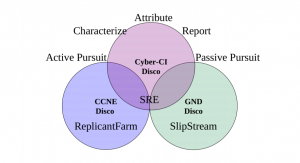News
Citizen Lab Research Fellow Ramy Raoof has recently joined the Board of Directors for the Tor Project. Raoof will bring his background as a technologist and security researcher to help the organization establish and strengthen mechanisms for community participation and transparency.
Citizen Lab partners Ramy Raoof and Luis Fernando Garcia have been named Heroes of Human Rights by Access Now for their work uncovering invasive surveillance tactics.
Deibert will be attending a screening of Black Code as well as a conference hosted by the Paris Institute of Political Studies.
Colnodo’s Linda Patiño has been selected by Internet Society as one of their 25 Under 25. Patino, who has worked on research for both Colnodo and Sula Batsu, was honoured for her use of ICTs to advance human rights. The award is used to highlight and celebrate young people from around the world who are using the Internet […]
Citizen Lab researchers and other signatories highlight Bill C-59’s troubling implications for cybersecurity and human rights as they pertain to Canada’s signals intelligence activities and Canada’s human intelligence activities.
September 27, 2017 – San Francisco, USA Hosted by swissnex San Francisco and the Consulate General of Switzerland in San Francisco, the two-day event will focus on the cross-section of humanitarian relief and technological advances, fostering discussions around how digital tools can be leveraged to help vulnerable communities.
Citizen Lab is excited to announce that Bram Abramson will be joining the team as a 2017 Ford-Mozilla Open Web Fellow. Bram will be bringing his skills as a lawyer to Citizen Lab to assist on issues related to telecom privacy and transparency.
As parents all over the world review back-to-school safety tips with their kids, researchers have revealed serious security vulnerabilities in South Korean children’s apps that may leave some parents asking: are our kids safer without them?
By now, issues of digital surveillance, government interference online, and programmatic targeting by businesses are common parlour talk. From Snowden to the recent and ongoing cases of government spying in Mexico, these acts have become a reality of the digital age. But what ethical, legal, and political questions and consequences lie at the intersection of digital governance and big data?
On August 30, 2017 Citizen Lab’s Reckless V report received front page coverage on the New York Times. This report revealed that Claudio X. González, Director of a prominent anti-corruption organization, was targeted with government-exclusive spyware produced by the NSO Group.









